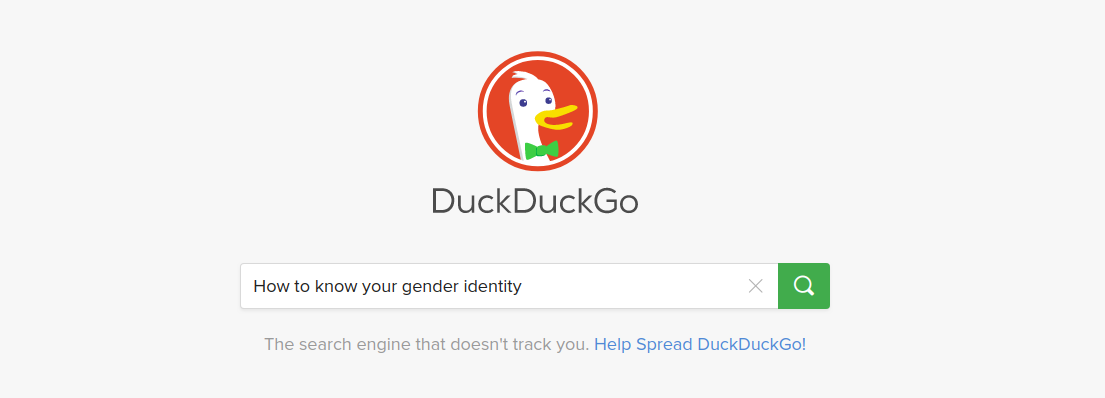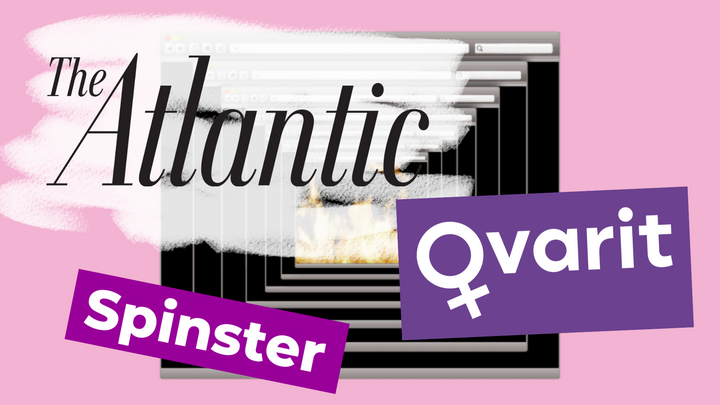I’m Not Trans, But I’m Definitely Not ‘Cis’
Will you respect my identity, too?

Growing up, I didn’t identify as a girl. I was told I was a girl every Sunday when my parents forced me into a dress for church — often in spite of my kicking and screaming. I learned for sure that I was a girl when I learned about girl and boy parts, which led to me exclaiming in excitement upon discovering a boy giraffe at the zoo. I never lived that one down but, in my defense, a giraffe penis is pretty exciting.
Despite the antiquated Sunday dress code, my mom was actually quite understanding of my resistance to traditional femininity. I was a tomboy, just like her. I liked playing outside, studying science, math, and space. I loved animals, and I liked to play as boy characters as much as girl ones. My favorite movies were 101 Dalmatians and Peter Pan — not a princess to be found.
My mom never forced femininity on me besides church and holidays. Growing up, she had been a tomboy, too. She kept her hair cut short like a boy, and made people call her a masculine version of her name, Karl, for years. Some of her friends from that era still affectionately refer to her as Karl rather than Karen. Today, she would probably be considered trans, sterilized as a child, and my three biological siblings and I would have never been born.


All of this has, naturally, led me to wonder about my own gender identity, which according to Merriam-Webster means:
A person’s internal sense of being male, female, some combination of male and female, or neither male nor female
There’s just one problem: I don’t have this internal sense. I observed the reality of my body and how others treated me because of it — that’s how I know I’m a female. My mom taught me about girl and boy parts, and I have girl parts. There was never anything spiritual or mystical about it.
As a young adult, the reality of my sex became very clear. I experienced rape, domestic abuse, unwanted pregnancy, two abortions, and sexual harassment at work. None of this was because of an internal sense of anything, it was because of my external reality as a woman living under patriarchy.
I’ve been called “cisgender” a lot — a label I never applied to myself or identified with. Usually, this word is applied to me in an attempt to invalidate my experiences as a female person. But, when I consider if this label truly does apply me, it’s clear that it doesn’t. Strictly speaking, I am neither trans nor cis.
Transgender is defined as:
Of, relating to, or being a person whose gender identity differs from the sex the person had or was identified as having at birth
And cisgender is the opposite:
Of, relating to, or being a person whose gender identity corresponds with the sex the person had or was identified as having at birth
Both of these definitions rely on gender identity, this internal sense of sex which I don’t have. Much like how atheists don’t have religion, some people don’t have a gender identity. In fact, I would argue, most people don’t. This “internal sense” of being male or female is entirely constructed by societal sex stereotypes. If your internal feeling is coming from external stereotypes, how innate is it, really?
Knowing there was a chance I was mistaken and I just hadn’t discovered my gender identity yet, I decided to do some research.

I found a series of personality quizzes, all dependant on sex stereotypes.
“Your gender is the foundation of your personality and indicates how you choose to express yourself,” stated the quiz that came up as the first result. The quiz asked me whether I dress masculine or feminine, and who my favorite Rocky Horror character is. I tried to answer as honestly as I could.
The results told me I was “transmasculine”:
You are Transmasculine!
As a “masculine center,” you actually possess a female body but prefer to enhance your physical traits as man. Perhaps you even identify as a man when we consider hobbies, interests, or overall emotional behavior. However, this does not necessarily mean that you don’t feel like a female now and then or that you always and entirely feel like a male; there’s the possibility that you are extremely in touch with your masculine side and choose to express it depending upon circumstance.
Another quiz told me I’m “agender,” one more told me I’m “genderfluid.”
I don’t wear dresses, skirts, or feminine clothing. I ditched makeup two years ago, and I prefer comfortable boots over heels. Is that what makes me not a woman, according to gender theorists?
A 2016 Teen Vogue article titled, “How to Figure Out Your Gender Identity” featured an illustration of an apparently female person debating between a frilly shirt and a sports jersey — female and male identities, I suppose. The article, like most of the quizzes and top search results, equates gender identity with preferred clothing style, “Something like wearing nail polish and/or a bow tie could make a big difference in how you feel!”
The truth is, being called “cisgender” is an insult to me. It erases my identity and experience of having no gender identity, and assumes that because I don’t call myself “trans” and am a female, I must identify with femininity. Since femininity is a constructed tool of the patriarchy used to oppress female people, those who call me “cis” are essentially victim-blaming, telling me that I must have identified with my oppression, and therefore I deserve it. This is misogyny.
Claire Graham, an intersex activist who has a difference of sex development called MRKH, wrote about why the term “cis” feels so wrong for her, too:
I didn’t feel like a boy… but neither did I feel like a girl. I could have been anything as far as I was concerned. My body didn’t tell me, neither did my brain.
Graham’s condition made it unclear until she received chromosomal testing whether she was biologically male or female. Unlike most people, who can usually safely guess by our primary and secondary sex characteristics, Graham’s experience was less clear at first. This presented the perfect opportunity for her to explore her gender identity, yet, despite the biological ambivalence, she found that she did not have one.
Others, such as J Nelson Aviance, have pointed out how the construction of “cisgender” seeks to uphold the oppressive gender binary which it claims to tackle. In an article for the Huffington Post, he argues that since gender identity is clearly, despite claims to the contrary, based nearly entirely on sex stereotypes and normative gender roles, prescribing the term “cis” to people against their will undermines the many non-normative ways in which someone can be a man or woman.
He makes a good point, if anyone who is not completely masculine or feminine is gender fluid to some degree, then finding a perfectly “cis” person is likely impossible. No one can ever match up to the inherently contradictory requirements of gender roles.
While a large portion of the trans community seems obsessed with validating their own identities, there remains a lack of respect for anyone else’s identity if it falls outside the newly prescribed roles. If it can be considered literal violence to misgender a trans-identifying person, the same standard of care must be applied unilaterally.
I don’t have a gender identity, so I don’t identify as “cis” — can you respect my identity, too?
Do you want to bring the "gender madness" to an end? Help us write about it! 4W is able to pay our all-female staff and writers thanks to the generous support of our paid monthly subscribers.
Enter your email below to sign in or become a 4W member and join the conversation.
(Already did this? Try refreshing the page!)





Comments